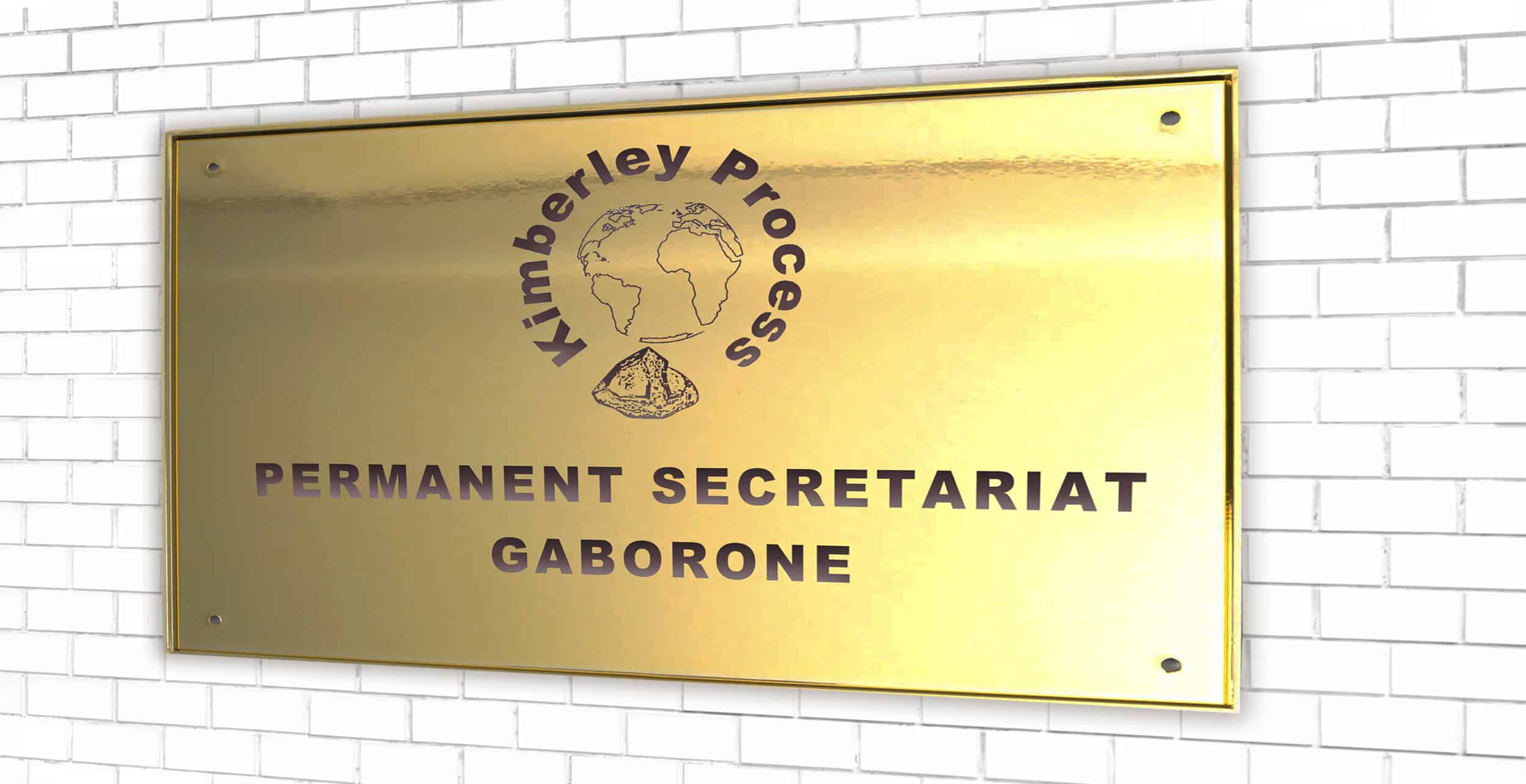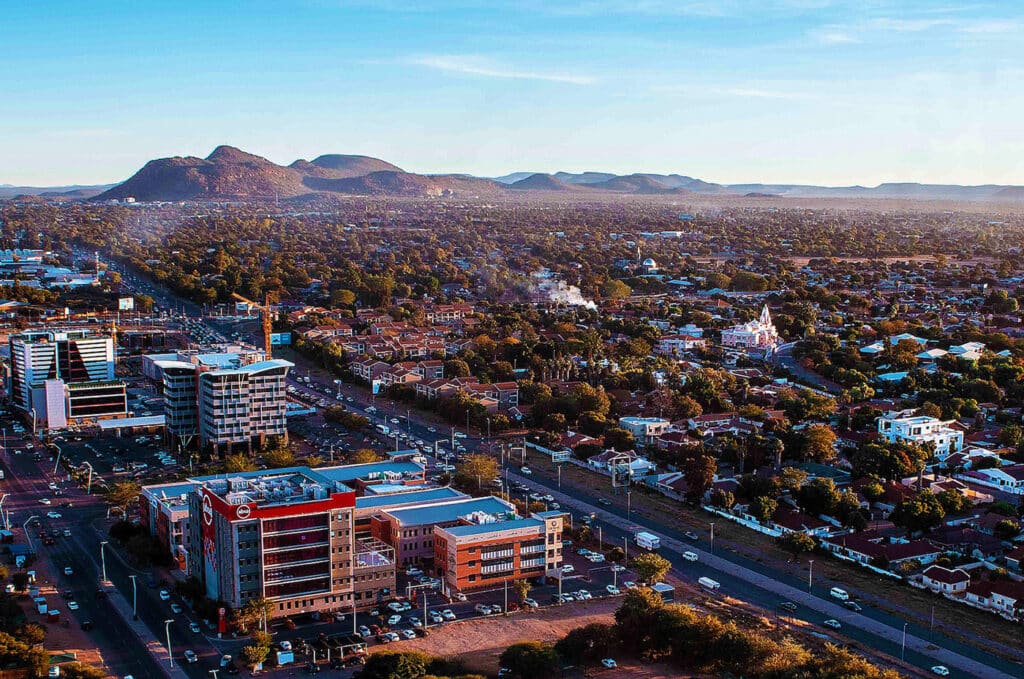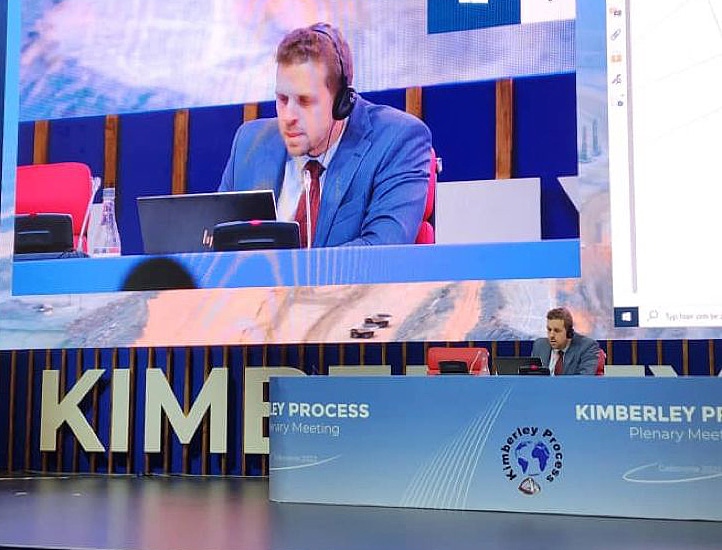Blog
Home » Diamonds blog » KIMBERLEY PROCESS HOPES TO BE STRENGTHENED AS IT ESTABLISHES A PERMANENT SECRETARIAT
Focus on

Photo courtesy the World Diamond Council newsletter.
Although it has been a fixture in the diamond industry since its certification scheme was launched in 2003, monitoring the flow of all mines rough diamonds into the pipelines to ensure that are not tainted by civil conflict, the Kimberley Process has been less an industry monolith and rather a loose alliance of nations with a common interest. It has had no permanent address nor group of technocrats to run it. It has been reliant completely on the good will of individual countries and organizations counted among its members and participants.
But a milestone was registered last November when the body approved a recommendation made by a Technical Expert Team (TET) chaired by the World Diamond Council, proposing that Botswana become the site of the prospective KP Permanent Secretariat. It is projected to begin operations in January 2024.
The fact that no permanent secretariat has functioned during the 23 years since the KP was established has posed an ongoing challenge to the organization, which for the past two decades has overseen the creation, implementation and operation of the most extensive regulatory system in the history of international diamond trade, the Kimberley Process Certification Scheme (KPCS) – an international mechanism that today encompasses 85 countries, and in 2021 monitored rough diamond sales to cutting centers worth about $16.4 billion.
The absence of permanent secretariat was in part a result of the haste in which the KP was established, at the height of the conflict diamond crisis in Africa during the early 2000s, but also due to the perception that a substantial infrastructure was not required. This is because the KPCS would not be implemented and enforced at the international level, but rather locally by the governments of KP member countries, or regionally in the case of the European Union.
The KPCS Core Document, which was approved in 2002 before the launch of the certification scheme, was somewhat vague about how the system would be managed. It did not provide for an annual administrative budget, and in practice, those KP participants that agreed to take on official roles in the organization also acquiesced to financing their own activities, with the country holding KP Chair at any point in time assuming the cost of a temporary secretariat.

Gaborobe, capital of Botswana, site the new KP Permanent Secretariat.
A STOPGAP MEASURE
At the 2011 KP Plenary meeting in Kinshasa, Democratic Republic of Congo (DRC), a stopgap solution was approved. It involved the establishment of a barebones, quasi-secretariat, which would become known as the Administrative Support Mechanism (ASM).
It was the industry rather than governments that assumed the task of financing and operating the ASM, with the task of managing the ASM was divided among four WDC members: the Antwerp World Diamond Center (AWDC), the Israel Diamond Institute Group of Companies, India’s Gem and Jewellery Export Promotion Council (GJEPC) and the Diamond House of the government of Ghana. The body was launched in 2013.
The maintenance of the KP Statistics website, however, which is one of the most complex administrative tasks carried out by the KP, remained solely in the hands of the organization’s Working Group of Statistics (WGS). For almost the entire period that the KP has been in operation, it has been chaired and administered by U.S. government, which has relied on the extensive expertise and capabilities of the International Trade Management Division of the U.S. Census Bureau.
BOTWANA WINS COVETED SPOT
Five countries submitted their candidacy for hosting the KP Permanent Secretariat, namely Austria, Botswana, the People’s Republic of China, the Russian Federation and the United States.
The United States and Russian Federation both withdrew from consideration in 2020. Austria followed suit in 2022 Austria and, shortly before the before start of the Plenary meeting in November, China voiced its support for the candidacy Botswana. This meant that the African country was the single candidate when the TET made its recommendation to the forum in Gaborone.
In its recommendation that was approved by the KP Plenary in November 2022, the financing of the KP Permanent Secretariat ’s operating budget for the first three years was also included. The largest single contribution would be made by WDC, which pledged U.S. $83,333 per annum.
To prepare for the physical launch of the KP Permanent Secretariat in Botswana, the 2022 KP Plenary set up a taskforce headed by Wim Soons, the outgoing TET chair, who represents the AWDC in the WDC.

WDC representative Wim Soon chairing the TEL during the Kimberley Process Plenary meeting in Botswana in November 2023. (Photo courtesy of the World Diamond Council newsletter.)
The immediate assignment for the taskforce will be to formulate terms of reference for the KP Permanent Secretariat. It can they then be registered it as a legal entity under Botswana law, which will enable the opening of a bank account, so as to be able to receive funding. As part of its original proposal, the government of Botswana pledged to arrange office facilities in downtown Gaborone.
The next task will be to recruit a Secretary General to head the new bureau. His or her appointment will need to be approved by KP Plenary.
During the third year of operation, it is envisioned that the KP Permanent Secretariat will assume the management of KP statistics, including the dedicated website, which currently is being done by the U.S. government. This will be addition to all other tasks today being performed by the ASM.
